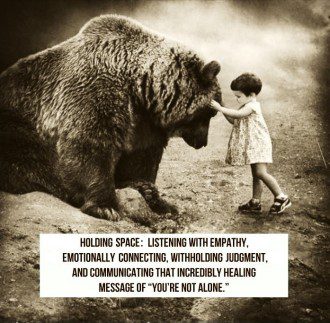By Lissa Rankin
Guest writer for Wake Up World
I first heard the term “generous listening” almost ten years ago, when I took a workshop for doctors with Rachel Naomi Remen, MD. She told us that most doctors don’t listen generously. They’re always in their heads, trying to fix someone, rushing to a diagnosis and treatment plan. Or they’re judging what the person is saying—“Do I like what this person is saying? Or do I not like it?” Or they’re comparing—“Am I smarter than this person? Or are they smarter than me?” Or they’re one-upping, thinking of other patients who are in even more pain or have even more dire straits than the person who’s talking. Or they’re interrupting, barely letting the patient get a word in edgewise.
In doctors, these patterns don’t tend to just apply to patients. Most of the doctors I knew, myself included, were so busy thinking and judging and fixing that they didn’t generously listen to anyone, not even their spouses or children or best friends, not even their own bodies, hearts, and souls.
[pro_ad_display_adzone id=”110028″]
When Rachel taught us how to generously listen, I felt so busted — and so relieved. There were tears everywhere. We were present with each other. We felt safe. I had never felt safe in a room full of doctors before. I even felt loved. I had definitely never felt loved by a room full of doctors.
Rachel and I now teach this exercise at the Whole Health Medicine Institute, a training program about raising consciousness in health care providers and returning the heart to medicine. Yet it’s not just doctors who have forgotten how to generously listen…
Spiritual Bypassing
Recently, I was attending a spirituality conference, and as I listened to many spiritual leaders, I noticed a similar tendency to employ what Robert Augustus Masters calls “spiritual bypassing,” using complex intellectual and spiritual principles as an attempt to bypass pain, conflict, and other conflicted human emotions. Spiritual bypassing is a common way to diminish the feminine within men and women — the emotional, the irrational, the heartbreak of a sensitive soul, but also the compassion. Lose the ability to be present with someone’s pain. Instead, there’s a tendency in some circles to use abstract spiritual principals to almost invalidate someone’s human pain in this dimension.
—“It’s all an illusion.”
—“You create your own reality.”
—“If you’re in pain, fix your thoughts.”
When did we lose our ability to simply be with what’s true for another hurting human being? When did we forget that our nervous systems go haywire when we go through trauma, and that when this happens, we need love, not fixing and certainly not judgment? When did we stop tending to one another’s hearts, not as a way of coddling old wounds, but as a way of expressing compassion and empathy?
I’m not suggesting that the incisive inquiry intended to question stuck thought patterns can’t be helpful. Sometimes this method is just what the doctor ordered when someone is in a negative spiral of limiting beliefs. But often, simply holding a container of safety and compassion helps someone unravel their own beliefs, tap into Source, and receive healing for their own pain. Empathy helps us learn not to fix, not to compare, not to judge or approve, but simply to be present as a compassionate witness.
It Hurts to Feel
Most of us were not trained how to feel strong emotions, how to let them move through our bodies like pure energy forms — letting anger churn through us, letting grief contract the heart like a labor pain, letting disappointment gut us, sitting with unmet longing as if she were an old friend. Instead, we numb. We shut down. We dissociate from the body. We close the heart.
When we expand our emotional resilience (read 10 tips for how to do this here), we increase our capacity to feel pain, but we also get to feel more euphoria, more ecstatic bliss. You don’t get to choose when it comes to strong emotion. When you cut yourself off from pain, you also cut yourself off from joy. And when you cut yourself off from your own pain, it’s impossible to feel true empathy for someone else who is hurting.
Now Is the Time to Bench Press Our Empathy Muscles
I know it’s hard to really feel what’s happening in our own hearts and on the planet right now. Species extinction. Mass genocides. Starving children. Immigrants wrenched from their families. Blatant disregard for women, minorities, and the LGBT community in our own White House. Hateful, intolerant polarization between people who should be loving, supportive neighbors. The devastation of Mother Earth.
This hurts. This hurts almost more than our tender hearts can bear. And yet, we must expand the capacity of our hearts to feel the pain of it all. Only then can we have empathy for ourselves and for one another. (To learn more, please read 10 Tips for Fully Feeling What Hurts Right Now, Without Going Insane.)
Like the Grinch Who Stole Christmas, whose heart was too small, let our hearts grow three sizes today.
Holding space for what hurts,

3 Videos to Ramp up Your Empathy
These three videos about empathy and holding space touch my heart every time I watch them. Shared with love…
What it really means to hold space for someone:
Brené Brown on empathy:
Empathy: the Human Connection in Patient Care:
Recommended articles by Lissa Rankin:
- Relationships on the Spiritual Path
- The “Space Between Stories”
- How to Make Your Body Ripe for Miracles
- Are You “Spiritual But Not Religious?”
- A Lesson In Empathy
- 10 Tips for Fully Feeling What Hurts Right Now, Without Going Insane
- 9 Practical Tips to Help You Find Your Calling
- 10 Fun Ways to Reduce Your Cortisol Levels
- 6 Stories To Make You Believe In The Power Of The Mind To Heal You
- 7 Tips For Finding Your Tribe
- 10 Surprising Things That Trigger “Fight-Or-Flight”
- How To Keep Your Heart Open When You Lose a Pet
- 8 Signs You’ve Lost Touch with Your Intuition – and 10 Tips to Help You Reconnect
About the author:
 Lissa Rankin, MD is a mind-body medicine physician on a grass roots mission to heal healthcare, while empowering you to heal yourself. She is the founder of the Whole Health Medicine Institute training program for physicians and healthcare providers, and the New York Times bestselling author of the books Mind Over Medicine: Scientific Proof That You Can Heal Yourself (2013), The Fear Cure (2014), and The Anatomy of a Calling (2015).
Lissa Rankin, MD is a mind-body medicine physician on a grass roots mission to heal healthcare, while empowering you to heal yourself. She is the founder of the Whole Health Medicine Institute training program for physicians and healthcare providers, and the New York Times bestselling author of the books Mind Over Medicine: Scientific Proof That You Can Heal Yourself (2013), The Fear Cure (2014), and The Anatomy of a Calling (2015).
Lissa blogs at LissaRankin.com and created the online community HealHealthCareNow.com. She is also the author of several other books, a speaker, a professional artist, an amateur ski bum, and an avid hiker. She lives in the San Francisco Bay area.
Connect with Lissa on Facebook and Twitter, or visit LissaRankin.com.
[pro_ad_display_adzone id=”110027″]







